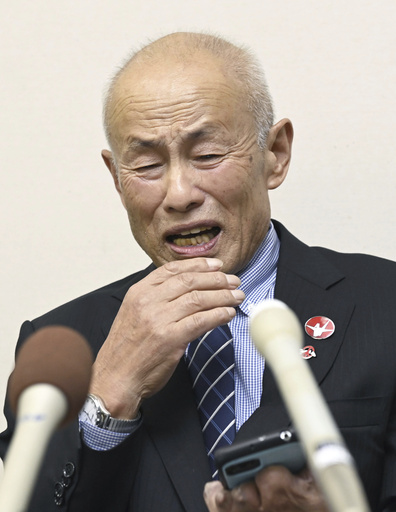TOKYO — The recent awarding of the Nobel Peace Prize to Nihon Hidankyo, an organization representing survivors of the atomic bombings of Hiroshima and Nagasaki, brings a renewed sense of hope to many Japanese who have endured the horrors of those attacks, along with their families. This recognition is seen as a potential catalyst for fostering a greater push towards a world without nuclear weapons, with a particular emphasis on encouraging the Japanese government to adhere to the nuclear weapons ban treaty.
Nihon Hidankyo is notably the first Japanese entity to receive the Nobel Peace Prize in half a century, following the honor given to former Prime Minister Eisaku Sato in 1974 for his efforts towards regional stability and Japan’s commitment to the Nuclear Non-Proliferation Treaty. The organization, which represents individuals who directly experienced the bombings, has garnered significant attention and respect for its advocacy for nuclear disarmament.
Toshiyuki Mimaki, an executive from the Hiroshima branch of Hidankyo, was visibly moved by the announcement. Upon receiving the news, he exclaimed, “Is it really true? Unbelievable!” while ensuring he was awake, pinching his cheek. Mimaki, who experienced the trauma of the Hiroshima bombing at just three years old, expressed optimism that receiving the Nobel Peace Prize would empower their mission towards achieving a nuclear-free world.
This award comes seven years after the International Campaign to Abolish Nuclear Weapons received the Nobel Peace Prize in 2017 for their significant role in promoting the Treaty on the Prohibition of Nuclear Weapons. Hidankyo’s members have played a pivotal role in amassing over three million signatures advocating for the treaty, urging the increasingly hesitant Japanese government to embrace the agreement and become a stalwart leader in nuclear disarmament, especially given Japan’s unique position as the only nation to have suffered from atomic bomb attacks.
Former Prime Minister Fumio Kishida faced backlash for his administration’s refusal to sign the treaty, insisting it was impractical as no nuclear-armed nation had endorsed it. Despite repeated assertions from Japanese leadership about acting as a mediator between nuclear and non-nuclear states, there has been a consistent refusal to join the treaty even in an auxiliary capacity.
Survivors of the bombings, known as hibakusha, have voiced their frustrations, suggesting that leaders are not genuinely committed to disarmament, particularly since Japan relies heavily on the U.S. for nuclear protection. Terumi Tanaka, a 91-year-old Hidankyo official and a survivor of the Nagasaki bombing, lamented the government’s inaction regarding the treaty. “I hope the Nobel Peace Prize opens up a chance to get the Japanese government to take the step,” she stated, emphasizing the urgent need to acknowledge the imminent shadows of nuclear threats facing the world today.
In the context of rising global tensions, Japan has been reinforcing security alliances in response to a more militarized China, alongside threats posed by North Korea and Russia’s expanding nuclear capabilities. The newly appointed Prime Minister Shigeru Ishiba, a proponent of a NATO-like security stance in Asia, commented on the importance of Hidankyo’s recognition, regarding it as a meaningful development.
The news of the Nobel accolade was met with widespread enthusiasm throughout Tokyo, where inhabitants celebrated the significant achievement. Sayaka Nakanishi, a high school teacher, expressed hopes that this particular honor would encourage global reflection on the ongoing discourse about nuclear weapons.
Gov. Hidehiko Yuzaki of Hiroshima echoed similar sentiments, interpreting the award as a warning against the escalating trend of global nuclear armament. He called for serious contemplation regarding the heartfelt pleas from hibakusha who wish for others to be spared from experiencing such traumatic events.
Survivors of the bombings continue to grapple with lasting health complications and societal discrimination stemming from their experiences. With the population aging and dwindling — 106,823 survivors are currently recognized for government medical support, with an average age of 85.6 — there is an urgent concern about preserving their narratives for future generations.
Nagasaki’s Mayor Shiro Suzuki, whose own parents were hibakusha, expressed optimism that Hidankyo’s global recognition would motivate younger generations to take up the cause. The atomic bomb dropped on Hiroshima on August 6, 1945, claimed 140,000 lives, followed by a second bomb on Nagasaki on August 9, resulting in an additional 70,000 casualties. Japan’s surrender on August 15, 1945, marked the conclusion of World War II, ending decades of military aggression across Asia.
Founded in 1956, eleven years after the bombings, Hidankyo emerged amidst Japan’s burgeoning anti-nuclear sentiment, especially in response to U.S. hydrogen bomb tests in the Pacific that exacerbated public health crises related to radiation exposure. However, many survivors continue to face difficulties in receiving adequate support, particularly those affected by the radioactive ‘black rain’ that fell beyond the officially designated zones after the bombings.
As we look forward, the hope remains that the Nobel Peace Prize awarded to Hidankyo will not only encourage stronger advocacy for nuclear disarmament within Japan but will also resonate globally, fostering a shared commitment to understanding and mitigating the inhumane impacts of nuclear weapons.
